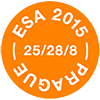RN coordinator:
Aurélie Mary, University of Tampere, Tampere, Finland
aurelie.mary(at)uta.fi
|
The 12th ESA conference will take place in Prague, Czech Republic, on 25-28 August 2015. The conference theme is “Differences, inequalities and sociological imagination”. Young people are especially subject to global processes, socio-economic and cultural change, and consequently the challenges these processes impose upon them. Inescapably, the lives of young people are directly affected by the current economic crisis, uncertain socio-economic integration, and the implementation of stringent policy measures. The gap between generations related to declining living standards for a large number of youth, uneven distribution of wealth and the weakening state of welfare regimes, is increasingly noticeable. A large number of young people are in vulnerable positions and at risk of social exclusion. However, some manage to negotiate their way into the societal sphere; others resist the current socio-political movements and construct alternative life paths. Many young people are victims of societal change but a large number displays great abilities in managing their own lives and pioneering new pathways. The youth of Europe, then, cannot be understood as one large homogeneous group. The variety of structural factors that operate in each country, as well as inherent characteristics (socio-economic background, education level, gender, ethnicity, religious background or geographical locality), continue to influence their life trajectories. Young people continue to represent a complex group with many facets that demand deep sociological reflection. |
|
The RN30 Youth and Generation board invites the submission of theoretical and empirical papers, which address aspects of young people’s experiences within contemporary societal conditions. The following themes are indicative suggestions:
JOINT SESSION A) with RN04 Sociology of Children and Childhood and RN28 Society and Sports
Sport participation: means of social inclusion or social exclusion?
Sports play an important role in the development and socialization process of children and young people. It is a means of bringing the youth together, yet at the same time, it can generate social exclusion. Depending on their socio-economic, cultural, ethnic or religious background, as well as sex and geographical location, children and young people's involvement into sports varies greatly. While sports might be a means of social integration for some, other become socially excluded by not being able to access sports activities.
We invite the submission of both empirical and theoretical papers addressing issues such as:
JOINT SESSION B) with RN5 Sociology of Consumption
Young people as consumers in leisure society The lives of young people are embedded in a large variety of available goods, ICT technologies, and leisure activities on the market. Contemporary culture strongly encourages the development of hedonistic attitudes and immediate gratification via the purchase of goods and leisure services. All media contents (TV-channels, magazines, internet contents) targeted to young people are increasingly commercialized, encouraging hedonistic and consumerist lifestyles. The culture of amusement is strongly connected to the entertainment industry, and the development of digital technology changes lifestyles. However, young people are not always aware of the potential risks they might encounter in this context. What are the consequences and potential hazards young people might face? In addition, a large number of youth engage in risky behavior and activities, such as drug consumption, binge drinking, gambling or spending too much time in online environments. Are young people victims or competent actors in consumer society? What message their behavioral practices convey? We encourage the submission of empirical and theoretical papers addressing issues related to:
|
|
Notes for authors Authors are invited to submit their abstract either to the general session or any specific session. Please submit only to one session. After abstract evaluation, coordinators will have the chance to transfer papers between sessions where applicable. Abstracts should not exceed 250 words. Each paper session will have the duration of 1.5 hours. Normally sessions will include 4 papers. Abstracts must be submitted online to the submission platform, see below. Abstracts sent by email cannot be accepted. Abstracts will be peer-reviewed and selected for presentation by the Research Network; the letter of notification will be sent by the conference software system in early April 2015. Abstract submission deadline (extended): 15th February 2015 Abstract submission platform: www.esa12thconference.eu |
|
If you have further questions on the conference, please visit the conference website. For further information on the Research Network, please visit www.europeansociology.org. |






